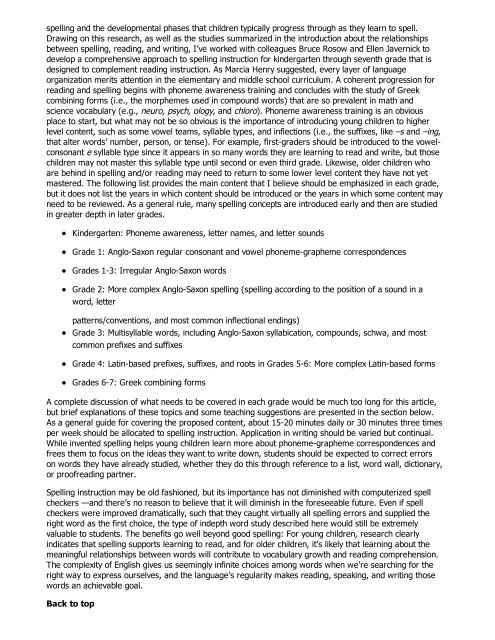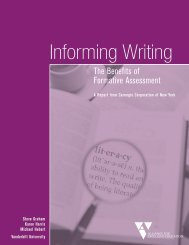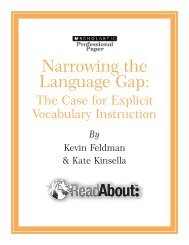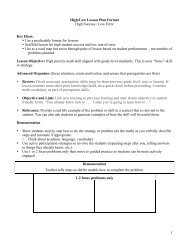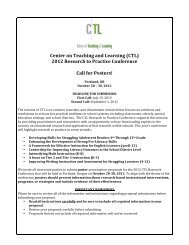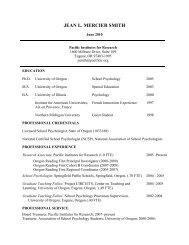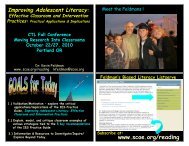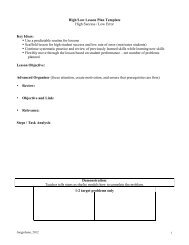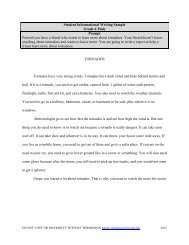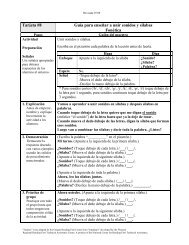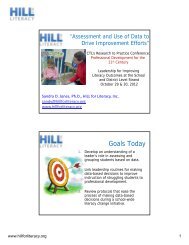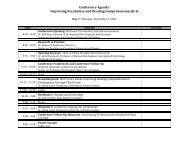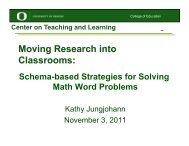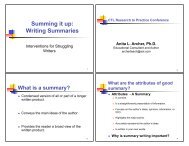How Spelling Supports Reading - Center on Teaching and Learning
How Spelling Supports Reading - Center on Teaching and Learning
How Spelling Supports Reading - Center on Teaching and Learning
Create successful ePaper yourself
Turn your PDF publications into a flip-book with our unique Google optimized e-Paper software.
spelling <strong>and</strong> the developmental phases that children typically progress through as they learn to spell.Drawing <strong>on</strong> this research, as well as the studies summarized in the introducti<strong>on</strong> about the relati<strong>on</strong>shipsbetween spelling, reading, <strong>and</strong> writing, I’ve worked with colleagues Bruce Rosow <strong>and</strong> Ellen Javernick todevelop a comprehensive approach to spelling instructi<strong>on</strong> for kindergarten through seventh grade that isdesigned to complement reading instructi<strong>on</strong>. As Marcia Henry suggested, every layer of languageorganizati<strong>on</strong> merits attenti<strong>on</strong> in the elementary <strong>and</strong> middle school curriculum. A coherent progressi<strong>on</strong> forreading <strong>and</strong> spelling begins with ph<strong>on</strong>eme awareness training <strong>and</strong> c<strong>on</strong>cludes with the study of Greekcombining forms (i.e., the morphemes used in compound words) that are so prevalent in math <strong>and</strong>science vocabulary (e.g., neuro, psych, ology, <strong>and</strong> chloro). Ph<strong>on</strong>eme awareness training is an obviousplace to start, but what may not be so obvious is the importance of introducing young children to higherlevel c<strong>on</strong>tent, such as some vowel teams, syllable types, <strong>and</strong> inflecti<strong>on</strong>s (i.e., the suffixes, like –s <strong>and</strong> –ing,that alter words’ number, pers<strong>on</strong>, or tense). For example, first-graders should be introduced to the vowelc<strong>on</strong>s<strong>on</strong>ante syllable type since it appears in so many words they are learning to read <strong>and</strong> write, but thosechildren may not master this syllable type until sec<strong>on</strong>d or even third grade. Likewise, older children whoare behind in spelling <strong>and</strong>/or reading may need to return to some lower level c<strong>on</strong>tent they have not yetmastered. The following list provides the main c<strong>on</strong>tent that I believe should be emphasized in each grade,but it does not list the years in which c<strong>on</strong>tent should be introduced or the years in which some c<strong>on</strong>tent mayneed to be reviewed. As a general rule, many spelling c<strong>on</strong>cepts are introduced early <strong>and</strong> then are studiedin greater depth in later grades.Kindergarten: Ph<strong>on</strong>eme awareness, letter names, <strong>and</strong> letter soundsGrade 1: Anglo-Sax<strong>on</strong> regular c<strong>on</strong>s<strong>on</strong>ant <strong>and</strong> vowel ph<strong>on</strong>eme-grapheme corresp<strong>on</strong>dencesGrades 1-3: Irregular Anglo-Sax<strong>on</strong> wordsGrade 2: More complex Anglo-Sax<strong>on</strong> spelling (spelling according to the positi<strong>on</strong> of a sound in aword, letterpatterns/c<strong>on</strong>venti<strong>on</strong>s, <strong>and</strong> most comm<strong>on</strong> inflecti<strong>on</strong>al endings)Grade 3: Multisyllable words, including Anglo-Sax<strong>on</strong> syllabicati<strong>on</strong>, compounds, schwa, <strong>and</strong> mostcomm<strong>on</strong> prefixes <strong>and</strong> suffixesGrade 4: Latin-based prefixes, suffixes, <strong>and</strong> roots in Grades 5-6: More complex Latin-based formsGrades 6-7: Greek combining formsA complete discussi<strong>on</strong> of what needs to be covered in each grade would be much too l<strong>on</strong>g for this article,but brief explanati<strong>on</strong>s of these topics <strong>and</strong> some teaching suggesti<strong>on</strong>s are presented in the secti<strong>on</strong> below.As a general guide for covering the proposed c<strong>on</strong>tent, about 15-20 minutes daily or 30 minutes three timesper week should be allocated to spelling instructi<strong>on</strong>. Applicati<strong>on</strong> in writing should be varied but c<strong>on</strong>tinual.While invented spelling helps young children learn more about ph<strong>on</strong>eme-grapheme corresp<strong>on</strong>dences <strong>and</strong>frees them to focus <strong>on</strong> the ideas they want to write down, students should be expected to correct errors<strong>on</strong> words they have already studied, whether they do this through reference to a list, word wall, dicti<strong>on</strong>ary,or proofreading partner.<str<strong>on</strong>g>Spelling</str<strong>on</strong>g> instructi<strong>on</strong> may be old fashi<strong>on</strong>ed, but its importance has not diminished with computerized spellcheckers —<strong>and</strong> there’s no reas<strong>on</strong> to believe that it will diminish in the foreseeable future. Even if spellcheckers were improved dramatically, such that they caught virtually all spelling errors <strong>and</strong> supplied theright word as the first choice, the type of indepth word study described here would still be extremelyvaluable to students. The benefits go well bey<strong>on</strong>d good spelling: For young children, research clearlyindicates that spelling supports learning to read, <strong>and</strong> for older children, it’s likely that learning about themeaningful relati<strong>on</strong>ships between words will c<strong>on</strong>tribute to vocabulary growth <strong>and</strong> reading comprehensi<strong>on</strong>.The complexity of English gives us seemingly infinite choices am<strong>on</strong>g words when we’re searching for theright way to express ourselves, <strong>and</strong> the language’s regularity makes reading, speaking, <strong>and</strong> writing thosewords an achievable goal.Back to top


